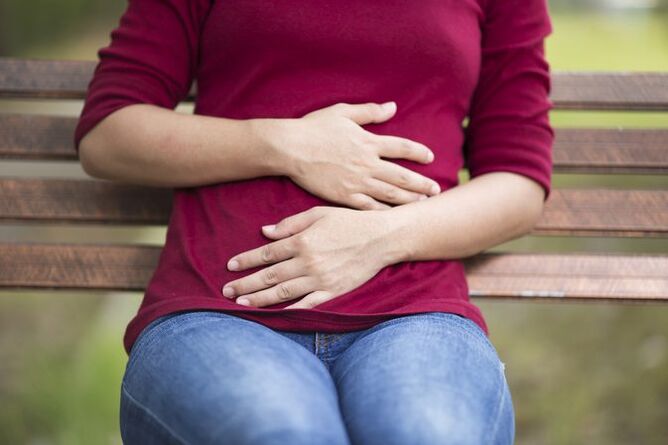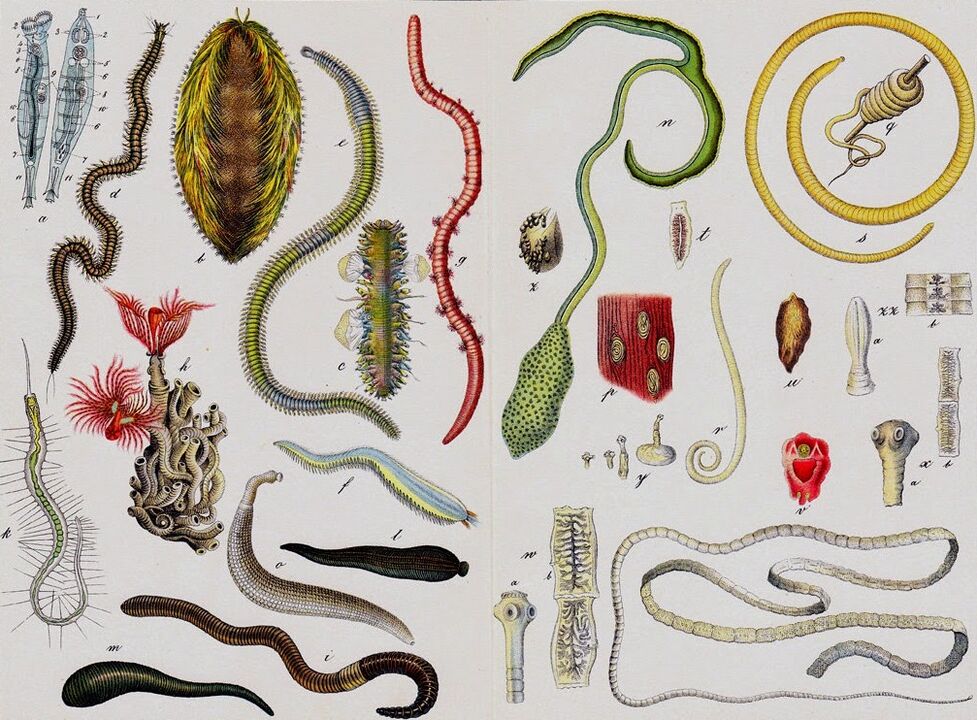In the body of an adult lives various microscopic cohabitants. Most of them are beneficial and our symbionts. These include about 500 species of bacteria that live primarily in the gut. However, many life forms enter the human body and begin to parasitize and poison the host's health.
An unwanted neighbor is a worm. They are parasites that infect the gut, liver, lungs, and in rare cases the muscles. All types of parasites are unified under the name worms, and infecting them is helminthiasis.
To answer the question of how to treat worms, it is necessary to understand how they enter the body. The main routes of infection are:
- When infected with worms that spend part of their life cycle on Earth, travel through the soil. Their developing eggs or larvae land on vegetables and fruits, which are later eaten. Animals infect the worms through the soil and then transmit them to humans.
- through contact with an infected person. The larvae can be spread through bedding, towels, and other items used by infected patients. According to statistics, 60% of the population has worms, and Asian immigrants are a special risk group.
- By eating contaminated meat or fish. Prolonged exposure to heat can destroy worm eggs and larvae.
- Sometimes insect bites can be the cause of the infection.
Once inside the human body, the worms actively reproduce and release toxic waste. Their accumulation and increased numbers can increase discomfort symptoms. To get rid of the parasite, you need to see a doctor and undergo a course of treatment.
Signs of worm infection in adults

The presence of parasites in organs can be determined by external signs. These included skin manifestations that significantly worsened her condition and caused itching. For example, inflammation, acne, cracked heels, delaminated nails.
A helminth infection has similar symptoms to other diseases. The enhancement of various manifestations depends on the location of the worm. In addition to the rash, intestinal disorders are characterized by:
- Unstable bowel movements;
- Special odor in the mouth, increasing gas formation;
- nausea;
- anal itching;
- Appetite increases along with weight loss.
Parasite toxins can also affect the nervous system, causing headaches and restlessness. Memory problems and depression may occur as the number of worms increases significantly. Due to the lack of vitamins and vital elements, the immune system cannot recover. A person often gets sick under the influence of viruses and bacteria. If the respiratory system is affected, coughing and choking episodes may occur.
If you notice these symptoms, you should consult your doctor. A specialist will determine the form of the parasite and prescribe medication based on the test results and a thorough examination.
Types of worms that live in humans

Treatment of the disease depends on the type of parasite that has settled in the internal organs. Various worms can affect certain tissues and cause specific symptoms.
The main forms of parasitic infection are:
- Pinworm disease is formed under the influence of pinworms. The small round creatures are located in the intestines and cause severe itching of the skin of the anus.
- Trichinella worms penetrate muscles through the vascular system. Symptoms come on suddenly and unexpectedly in the form of fever, fever, and swelling of the eyelids and face.
- Vlasoglavy is a nematode and affects the large intestine. There are few or no signs of the disease. There may be dizziness, abdominal pain, and appendicitis.
- Defeat different types of tapeworms. These include bovine tapeworm, broad tapeworm, and pork tapeworm. The parasites live in the gut, unlike ribbons, which are divided into many small parts. Symptoms are characterized by dizziness, abdominal pain, and constipation.
The most common reasons for these forms of intrusions are failure to observe personal hygiene and the consumption of poorly fried meat. Pets are also a source of parasite transmission.
If a patient has symptoms of a worm infection, the doctor will confirm the diagnosis with the help of laboratory tests. In most cases, stool is examined for helminth eggs and an enzyme immunoassay is performed. Additionally, anal scrapings, endoscopy, and ultrasonography can be studied.
Medications needed to treat worms
If worms are found in humans, doctors will prescribe medication. To get rid of the disease, many people turn to traditional medicine. Combination therapy can be used, but its effectiveness will be monitored by a specialist.
The presence of worms in internal organs is not a dangerous diagnosis if the disease is detected in time and a course of medication is prescribed. Their effects will be aimed at destroying the parasites that poison the bodies of infected people. Human health was restored after removal of the worms and their metabolites.
Due to the need to inhibit parasites, the composition of the drug will contain components that affect its ability to absorb nutrients. Lack of nutrients and reproductive conditions can cause the worms to die.
Drugs are divided into the following groups according to the type of action they have on the worms:
- The active ingredient blocks the worm's nervous and muscular system. They become paralyzed, unable to attach to the intestinal wall and excrete from the body.
- The drug interferes with the process of glucose oxidation in the parasite, causing it to die.
- Drugs that block cellular tubulin formation and ATP synthesis.
- Drugs that affect the intestinal system of worms.
- Component that destroys the worm's shell. They are exposed to calcium and digested by the human intestinal system.
There are drugs with a wide range of effects, targeting specific types of worms. The choice of medication is made by a doctor based on tests, severity of symptoms, and treatment. Also, take into account possible contraindications to the use of the drug.
In addition, funding is provided for the elimination of manifestations of allergic reactions to parasite toxins. Taking these tablets reduces the level of poisoning of worm waste and reduces symptoms of the disease. Auxiliary components are used alone for complex helminthiasis processes.
Atypical approach to treating helminthiasis

The use of drugs is particularly effective in fighting worms. The only disadvantage of drugs is their contraindications. For this condition, use non-drug treatments:
- Ayurveda;
- oxygen exposure;
- Alcohol treatment.
The Ayurvedic system of Indian medicine enhances the overall tone of the body, rejuvenates and helps fight worms. According to this teaching, the cause of infection with worms is the failure to observe personal hygiene and purity of mind. Special exercises are used to help maintain health, and laxative decoctions are used. Herbs are combined with hot spices to remove toxins from the body. Successful use of thyme, wormwood, St. John's wort, and a week off from the course.
The essence of oxygen therapy is to saturate the cells of the gastrointestinal tract with the appropriate gas. To do this, a tube is inserted into the esophagus and oxygen is pumped through it. This process is repeated for several days. Ozone therapy is also used to kill worms. Insert the tube into the anus this way. It provides an ozone-oxygen mixture through which the worms are paralyzed. Olive oil and ozone enemas are sometimes used.
Alcoholic beverages are used as part of the treatment. Mix equal parts cognac and tea and drink on an empty stomach with a laxative. Cognac is used as a stand-alone medicine, one tablespoon for five days. Destroy the worms with garlic for 10 days of vodka infusion.
Traditional Medicine Methods for Treating Worms

Various folk remedies allow you to choose the best treatment for each infection. Natural ingredients that affect parasites include:
- Pumpkin and flaxseed are combined with laxative soup.
- Wormwood, pomegranate infusion.
- Phytocides in garlic and onions.
- Ginger root with sugar.
- Dried clove seeds, ground in a coffee grinder.
- Enema with castor oil and baking soda.
The choice of formula depends on the type of worm in the body. Based on the test results, the parasitologist will select the best combination of different treatments.
Ways to Prevent Worm Infections
In all cases it is possible to stay healthy according to the rules of personal hygiene. Wash your hands with soap and water when you are in public places and after taking public transportation. Underwear cleanliness needs to be monitored to prevent dirt buildup under the nails.

Pets should be dewormed every six months. It is important to clean the surfaces of your hands with antibacterial soap after contact with stray dogs and cats.
Vegetables, fruits and herbs should be washed thoroughly before consumption. Meat and fish should be cooked at high temperature for at least 40 minutes.
Following these recommendations will help avoid infection and subsequent treatment.



























